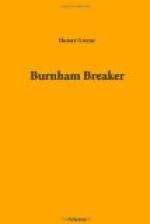“Gentlemen of the jury, I have labored at the bar of this court for more than thirty years, but I never saw before a specimen of moral courage fit to bear comparison with this; I never in my life before saw such a lofty deed of heroism so magnificently done. And do you think that such a boy as this would lie? Do you think that such a boy as this would say to you one word that did not rise from the deep conviction of an honest heart?
“I leave the case in your hands, gentlemen; you are to choose between selfish greed and honest sacrifice, between the force of cunning craft and the mighty power of truth. See to it that you choose rightly and well.”
The rumble of applause from the court-room as Goodlaw resumed his seat was quickly suppressed by the officers, and Sharpman arose to speak. He was calm and courteous, and seemed sanguine of success. But his mind was filled with the darkness of disappointment and the dread of disaster; and his heart was heavy with its bitterness toward those who had blocked his path. He knew that Ralph’s testimony ought to bear but lightly on the case, but he feared that it would weigh heavily with the jury, and that his own character would not come out stainless. He hardly hoped to save both case and character, but he determined to make the strongest effort of which he was capable. He reviewed the testimony given by Mrs. Burnham concerning her child and his supposed tragic death; he recalled all the circumstances connected with the railroad accident, and repeated the statements of the witnesses concerning the old man and the child; he gave again the history of Ralph’s life, and of Simon Craft’s searching and failures and success; he contended, with all the powers of logic and oratory at his command, that Ralph Burnham was saved from the wreck at Cherry Brook, and Was that moment sitting by his mother before the faces and eyes of the court and jury.
“Until to-day,” he said, “every one who has heard this evidence, and taken interest in this case, has believed, as I do, that this boy is Robert Burnham’s son. The boy’s mother believed it, the counsel for the defence believed it, the lad himself believed it, his Honor on the bench, and you, gentlemen in the jury-box, I doubt not, all believed it; indeed it was agreed by all parties that nothing remained to be done but to take your verdict for the plaintiff. But, lo! this child makes his dramatic entrance into the presence of the court, and, under the inspired guidance of defendant’s counsel, tells his story of eavesdropping, and when it is done my learned friend has the temerity to ask you to throw away your reason, to dismiss logic from your minds, to trample law under your feet, to scatter the evidence to the four winds of heaven, and to believe what? Why, a boy’s silly story of an absurd and palpable lie?




